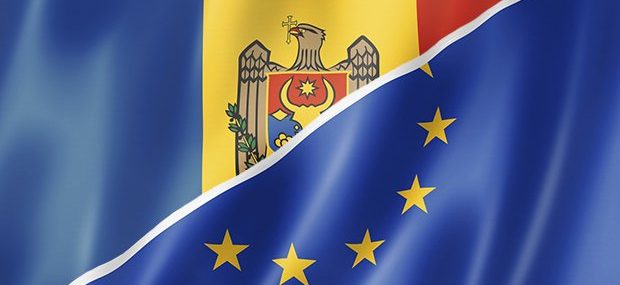Less than one month ahead of the next Eastern Partnership summit, the Republic of Moldova is again in Brussels’ spotlight. The country’s commitment and adherence to a path of more closely aligning with the European Union is rapidly fading despite being considered back in 2014-2015 the “successful story” of the EaP initiative. The government in Chisinau, which has proclaimed itself to be “pro-European” has shown no desire to push for necessary reforms in key areas, such as the justice sector. Instead, it has acted with the sole purpose to maintain power and preserve the status quo after the parliamentary elections of 2018, regardless of the costs for relations with the EU.
The fact that Moldova’s government has been increasingly non-acquiescent and non-cooperative with the EU is becoming obvious even to some of the non-believers in Brussels who, until recently, promoted a policy of eyes wide shut towards Moldova. As long as the country was at least pretending to be committed to a reform process and broadly on course with EU-friendly policies, little attention was being paid to Moldova. But the latest news from Chisinau reveal that the country has derailed from its European path and that the government, although in dire need of the EU’s financial assistance, continues to defy it on key topics such as the electoral reform.
In the last months, the EU has not only delayed the decision on a 100 million Euro macro-financial assistance programme for Chisinau, but has also decided to cut a budget support programme for justice reforms and to postpone support programs in other four key areas, specifically citing Chisinau’s “insufficient commitment” to necessary reforms. This represents an unusually tough stance for the EU and a sign that the patience in Brussels towards Moldova is diminishing.
What happened to Moldova?
Moldova’s commitment towards a European path has always been seen as a “win-win” situation both in Brussels, which maintained a degree of influence in the country, and in Chisinau, which could play the winning card of the country’s “Europeanization”. But as the EU process developed over time becoming more demanding and new pro-European political forces emerged in Moldova demanding more and quicker reforms, the political calculus changed and the political alliance currently in power gravitating around the Democratic Party and backed by the controversial oligarch Vladimir Plahotniuc came under increasing pressure.
At present, the governing coalition enjoys all-time-low public support. Recent surveys from November 2017 show that the Democratic Party who dominate the current Parliament, would only receive 8 percent in the next elections, while the current extra-parliamentary, pro-European party “Action and Solidarity” led by Maia Sandu would win 21 per cent of the vote. At the same time, protests organized by the extra-parliamentary opposition and civil society discontent have spread in the country. This has changed the ruling coalition’s political calculus: it is now squarely focused on maintaining power, at all costs.
As part of these efforts, the ruling coalition has struck a bargain with parts of the opposition, mainly the Socialist Party led until recently by the current president Igor Dodon. This arrangement between the governing Democrats and the Socialist Party has led to significant changes to the electoral system, despite the negative opinion of the Venice Commission and EU officials.
The new mixed electoral formula, passed by a wide consensus in Parliament, provides for half of the deputies to be elected in single-seat majority constituencies and the other half to be elected through proportional party lists. Such a formula favours larger parties, such as the Democrats and the Socialists, which are well established and have access to resources, while making successfully competing more difficult for newly established smaller parties.
Why would a supposedly “pro-European” government stand shoulder to shoulder with the Socialist opposition, who are staunchly pro-Russian and Eurosceptic, in promoting such electoral reforms? Part of the reason is the more than “friendly” relationship that has developed between the leaders of the two parties, Vladimir Plahotniuc and Igor Dodon.
Despite public animosities, the two leaders share a common goal: preservation of power and status quo and not allowing new pro-European established parties (“Action and Solidarity” and “Dignity and Truth Platform”) have a chance in winning the next parliamentary elections. The same machinations have played a crucial role in the presidential elections of 2016, when despite widespread public support for Maia Sandu (supported by an alliance of extra parliamentary parties), the Democrats played a major role in the narrow victory of Igor Dodon.
Igor Dodon, de facto leader of the Socialists, has not only once stated its intentions to denounce the Association Agreement with the European Union and join the Eurasian Economic Union led by the Russian Federation, based his entire campaign on criticizing both EU and Romania (“The Romanian gendarme will not be our master”). But despite such rhetoric, Dodon, alongside Vladimir Plahotniuc, is interested mainly in maintaining power. In this, the deal struck between Democrats and Socialists serves their shared purpose.
But reforming the electoral system was nothing short of clear defiance of the European Union. The Venice Commission and ODIHR joint opinion on the electoral reform has explicitly stated that the proposed legislation raises serious concerns and has important shortcomings, and therefore should not be implemented in its current form. Among the significant concerns underlined by the Venice Commission are: i) lack of broader consensus and no public consultations, ii) unclear criteria and discretionary methods for establishing constituencies, iii) no clear criteria for the representation of Transnistria and of Moldovan citizens living abroad, and, iv) constituency members of parliament would be vulnerable to being influenced by business interests.
So how did the European Union and Romania, the country that theoretically assumed a leading role in promoting the Europeanization of Moldova, respond?
EU response
In October, the situation in Moldova was discussed for the third time in six months by the European Parliament. Although a vote on the proposal of the EPP Group to freeze EU assistance to Moldova was postponed, it is becoming increasingly obvious that the “eyes wide shut policy” of denial is no longer tenable. The likely win of the Socialist Party in the November 2018 parliamentary elections would completely derail Moldova’s already shaky path of rapprochement with the EU.
With this scenario in mind, the debates in the EU Parliament have highlighted severe fractures between political groups, as well as between Romanian MEPs. For instance, several Romanian MEPs (members of the S&D and ALDE) have shown an extremely friendly attitude towards the government in Chisinau, ignoring completely the effects of the new electoral reform or the government’s lack of commitment to reforms. The fracture can be seen also within members of the same political family, as, for example, various other ALDE members strongly criticized the government in Chisinau. This lack of sending a clear signal was another missed opportunity for the EU to act on Moldova.
The EU Commission’s response to the recent developments in Chisinau has been tougher. In a speech delivered by Commissioner Stylianides on behalf of High Representative Federica Mogherini, she underlined the gulf between what Moldova assumed to do as part of the Association Agreement and what it is actually doing. Stylianides pointed out that the granting of financial assistance was inextricably linked to reforms, democracy, the rule of law and human rights. Backsliding, such as the new electoral law would influence decisions on the pending budget support payments.
Romanian response
In the EU’s relationship with Moldova, Romania plays an outsized role. Romania is the largest single donor to Moldova and one of its most important trading partners. Because of the close economic, political and cultural ties, Romania could play a positive and proactive role in mediating between the EU and Romania. However, Bucharest has opted to completely ignore the reality on the ground in its neighbouring country and its increasing defiance of the EU. In September 2017, the Romanian government approved the payment of the last instalment from a 150 million Euro loan, with both the Government and the Presidential Administration praising the “excellent work” of the government in Chisinau.
In effect, both the Romanian government and the President are supporting the status quo in Moldova. Behind the façade of ostensibly supporting Moldova’s EU path and its democratic institutions, the Romanian government is propping up a government with an almost non-existent approval, marred by controversies and disillusioning the pro-European citizens of Moldova.
What next?
Postponing the financial assistance has already caused trouble for Chisinau, as the first two instalments were budgeted by the government for 2017. However, the pressure is still relatively low, as the EU is still deciding which alternative to choose. Yet, both the “nuclear” option of cutting assistance for good and the “wait-and-see” option might similarly lead to a point of “no return” for Moldovan rapprochement with the EU considering the likely outcome of the November 2018 elections.
Romania’s current approach on Moldova is not only hindering the country’s European path, but also is diminishing its own role in its neighbourhood. There is a growing frustration among Moldovan citizens on the role that the Romanian administration is playing, supporting a regime with virtually no popular support.
In light of what has already happened and is yet to come, the European Union will need to speed up the pace of its decision-making processes and start putting pressure on Moldova. The goal must be to not only to reverse the effects of the electoral reform, to give the newly established parties a fair chance to enter the Parliament and strengthen multi-party democracy, but also for the government to stop mimicking reform and undertake serious and genuine reform efforts. It is not too late to get Moldova back on track of its currently derailed European course.







